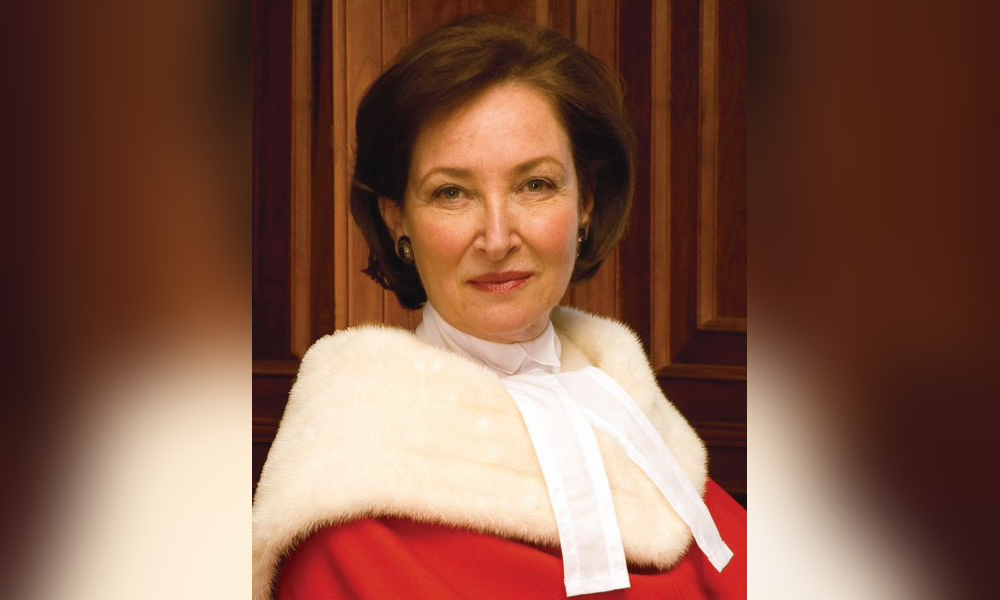
Her impact in this area informed my personal and professional advocacy success

When she reached the mandatory retirement age of 75 on July 1, 2021, Justice Rosalie Silberman Abella stepped down from the Supreme Court of Canada after 17 years at the top court. Many have been singing her praises in recognition of her considerable contribution to Canadian jurisprudence. As a human rights lawyer living with a disability and a disability/accessibility advocate, I add my voice to the chorus to share her substantial impact on the lives of Canadians with disabilities, as seen in two reports and two select SCC decisions.
Justice Abella’s in-depth foray into disability rights began in 1983 when she wrote the report, “Access to Legal Services by the Disabled,” the Ontario study that explored a long-standing issue. The report’s opening paragraph sets the stage:
“There is no more powerful measure of a society’s quality than the way it treats its disadvantaged. It takes no great sensitivity or insight to accommodate the needs of the majority. These needs, largely basic and obvious, merely compete for degrees of implementation. The unique needs of the disadvantaged, on the other hand, compete for simple recognition.”
Noting that disability discrimination often results from being uninformed rather than malevolent, she cautioned that denial of equality for the minority threatens the wellbeing of the majority. Written nearly 40 years ago, these words remain true. In prefacing her list of 100 recommendations (most of which await implementation today), she reminded the reader, “We are not creating new rights, we are fulfilling existing ones.”
A year later, Justice Abella became the sole Commissioner of the Royal Commission on Equality in Employment. She recently told Maclean’s about her struggle to determine the meaning of equality as she began her work:
“If you treat everyone the same, the person in a wheelchair is treated like the person who’s able-bodied, and there’s no need for a ramp, if you’re going to treat everybody the same. So it occurred to me that what equality really was, was acknowledging and accommodating differences. So people could be treated as an equal and not excluded arbitrarily for things that had nothing to do with whether or not they could contribute to the mainstream.”
As a result of Justice Abella’s comprehensive analysis, the distinctly Canadian concept of substantive equality was born, along with her term, “employment equity.” Governments adopted her legal theories on equality and discrimination in New Zealand, Northern Ireland, and South Africa and became the foundation of the SCC’s first equality ruling under the Charter of Rights and Freedoms in the 1989 Andrews v. Law Society of British Columbia decision.
While in law school, I read the 2007 Council of Canadians with Disabilities v. VIA Rail Canada decision with great interest. Writing for the majority, Justice Abella held that modifying 30 cars to make them wheelchair accessible would not cause VIA Rail undue hardship. The rights of people with disabilities were not to be counterbalanced by the economic motivation of VIA Rail to acquire inaccessible cars at a lower price.
Another seminal disability rights case, Moore v. British Columbia (Education), was heard in 2012. Jeffrey Moore, a student with severe dyslexia, was denied accommodation for his disability. Again writing for the majority, Justice Abella found that the school board failed to accommodate Moore’s learning disability and provide meaningful access to education. By clarifying the obligations of school authorities, the decision remains one of the leading cases on the meaning and definition of equality in a school context.
Justice Abella and I share two life-changing dates. The first was in 2004 when Justice Abella began her SCC tenure, and I started law school at Western University. The second date is Sept. 3, which has profoundly impacted both of us. That is the day Justice Abella’s parents married in Poland in 1939, just two days after the Nazi invasion, and the day in 2018 that my mother and fiercest disability advocate, took her last breath. Our parents set ablaze our passion for fairness. It appears that we subscribe to a line from the Roman poet Virgil’s The Aeneid: Vires acquirit eundo (loosely translated, “One gathers strength as one goes”). Our body of work demonstrates that inequality stokes our fires, and those embers are far from being extinguished. To borrow from the Greek philosopher Epictetus, may we long persist and resist.
Along with Rosalie Abella, Lorin MacDonald is one of Canadian Lawyer’s Top 25 Most Influential Lawyers of 2021